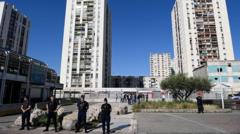In response to calls for national protests against President Emmerson Mnangagwa, Zimbabwe has experienced a significant shutdown, as citizens, wary of the heavy police presence, chose to remain at home rather than participate in demonstrations.
Zimbabwe Responds to Protest Calls with Nationwide Shutdown

Zimbabwe Responds to Protest Calls with Nationwide Shutdown
Zimbabwe's government tightens security as citizens remain indoors amid rising tensions.
The planned protests, aimed at forcing Mnangagwa to resign over alleged corruption and attempts to extend his presidency, saw minimal participation and were quickly met with police dispersal tactics. Protest leader Blessed Geza's calls for solidarity seemed to fall on deaf ears, with only a limited number of participants risking participation. The streets of major cities and towns bore testimony to an overwhelming sense of caution as businesses closed, schools shut their doors, and public transport dwindled, reflecting widespread fear of violent repercussions.
Geza, who seeks a replacement for Mnangagwa in Vice-President Constantine Chiwenga, had previously urged citizens to "fill the streets," but the reality turned out to be vastly different. Reports surfaced of police using tear gas to disperse even small groups of demonstrators, leading many Zimbabweans to voice their concerns about the state of the nation and their hopes for change.
Geza's appeal to the public was not well-received, prompting a backlash from multiple quarters, including members of Mnangagwa's Zanu-PF party, who dismissed the events of the day as distorted by social media narratives. However, political analyst Ibbo Mandaza noted that the low turnout still made a strong political statement against the current regime, highlighting the gravity of the citizens' collective apprehension.
A notable aspect of the unrest is the fear of escalating violence and civil conflict, as voiced by clergy members and everyday citizens. Many expressed worries about purported plans from the President to extend his term until 2030, despite constitutional limitations on presidential tenure. This looming threat amplifies the political chaos but also further solidifies dissent against a government grappling with a legitimacy crisis.
Despite promises from Mnangagwa to step down in three years, skepticism remains high. The atmosphere in Zimbabwe paints a picture of a nation on edge, with political strife juxtaposed against widespread public desire for change.
As the situation develops, the world watches how this political unrest will shape the future of Zimbabwe and its trajectory towards stability.
Geza, who seeks a replacement for Mnangagwa in Vice-President Constantine Chiwenga, had previously urged citizens to "fill the streets," but the reality turned out to be vastly different. Reports surfaced of police using tear gas to disperse even small groups of demonstrators, leading many Zimbabweans to voice their concerns about the state of the nation and their hopes for change.
Geza's appeal to the public was not well-received, prompting a backlash from multiple quarters, including members of Mnangagwa's Zanu-PF party, who dismissed the events of the day as distorted by social media narratives. However, political analyst Ibbo Mandaza noted that the low turnout still made a strong political statement against the current regime, highlighting the gravity of the citizens' collective apprehension.
A notable aspect of the unrest is the fear of escalating violence and civil conflict, as voiced by clergy members and everyday citizens. Many expressed worries about purported plans from the President to extend his term until 2030, despite constitutional limitations on presidential tenure. This looming threat amplifies the political chaos but also further solidifies dissent against a government grappling with a legitimacy crisis.
Despite promises from Mnangagwa to step down in three years, skepticism remains high. The atmosphere in Zimbabwe paints a picture of a nation on edge, with political strife juxtaposed against widespread public desire for change.
As the situation develops, the world watches how this political unrest will shape the future of Zimbabwe and its trajectory towards stability.


















